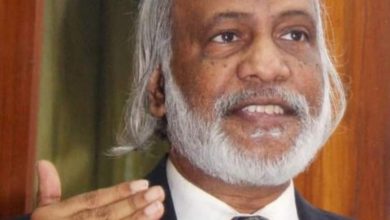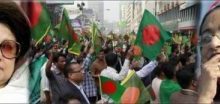The Incompetence and Failures of Sheikh Hasina: A Call for Change

।। By Md. Saiful Islam ।।
Sheikh Hasina, the current self-elected Prime Minister of Bangladesh, is widely regarded as one of the most incompetent and failure-prone leaders in the country’s history. Utilizing every aspect of state machinery to maintain her grip on power, she has been accused of record levels of violence against opposition figures, including disappearances and extrajudicial killings not to tell about the shattering of all electoral process in Bangladesh. Critics argue that her administration’s tactics have created an atmosphere of fear and repression, stifling free speech and political dissent. This has not only damaged the democratic fabric of the nation but also led to widespread human rights violations, attracting condemnation from international watchdogs and human rights organizations.
Additionally, her alleged subservience to India has raised significant concerns about the long-term sovereignty and independence of Bangladesh. Observers note that various deals and agreements with India appear to prioritize Indian interests over those of Bangladesh. This has led to fears that the country is becoming increasingly dependent on its neighbour, undermining its autonomy. The economic and political concessions made to India are viewed as compromising national security and jeopardizing the future prosperity of Bangladesh. This perception of subservience has fuelled nationalist sentiments and discontent among the populace, further polarizing the political landscape.
Historical Parallels: Sheikh Mujibur Rahman
Like her father, Sheikh Mujibur Rahman, who also came to power with alleged support from India by disintegrating the then Pakistan, Sheikh Hasina has been accused of consolidating power through any means necessary. Sheikh Mujib’s tenure saw economic mismanagement that turned Bangladesh into a so-called “basket case.” His policies and governance failures led to severe economic hardships, inflation, and widespread poverty in the early years of Bangladesh, i.e. from 1972-1975. The aftermath of his rule left a lasting negative impact on the country’s economic development, setting a precedent for governance that prioritized power retention over national welfare.
Hasina, following in her formidable father’s footsteps, has also been accused of rampant corruption and nepotism, further eroding the nation’s economic foundations. Her administration has been plagued by allegations of financial misconduct, where government funds have been misappropriated for personal gain. The nepotistic practices have seen key government positions filled by family members and loyalists, leading to inefficiencies and corruption within the bureaucracy. This has not only hindered economic progress but also undermined public trust in government institutions, exacerbating the challenges facing Bangladesh.
Corruption and Financial Mismanagement
Under Hasina’s administration, massive financial scandals have rocked the nation. Banks such as Sonali Bank, Janata Bank, BASIC Bank, and Farmers Bank have all been implicated in high-profile embezzlement cases. These scandals have involved billions of dollars and have severely damaged the credibility of the country’s financial system. Despite grand promises to combat corruption, her government has failed to recover significant amounts of the stolen funds. This failure is often attributed to the involvement of powerful political figures in these scams, who enjoy impunity under Hasina’s protection.
Instead, it appears that funds are continuously siphoned off to foreign accounts, depleting national reserves and crippling the economy. The illicit transfer of wealth has not only weakened Bangladesh’s financial stability but has also deprived the country of critical resources needed for development. This persistent outflow of capital has contributed to a growing economic crisis, marked by rising debt levels, inflation, and unemployment. The inability to curb corruption and recover misappropriated funds has left the country in a precarious financial situation, with limited options for economic recovery and growth.
Repression of Opposition
Sheikh Hasina’s regime is marked by severe repression of political opposition. Leaders and activists from parties like BNP, Jamaat and Bangladesh Khelafat Majlish have faced arrests, torture, and extrajudicial killings. The systematic targeting of opposition members has created a climate of fear, discouraging political participation and dissent. This has effectively silenced many voices that could hold the government accountable, leading to an erosion of democratic principles and institutions. The government’s heavy-handed approach has been widely criticized for undermining political freedoms and human rights.
Intellectuals and religious scholars have also been targeted in an attempt to stifle dissent. The educational curriculum has been altered to include anti-Islamic literature, aiming to suppress Islamic values among the youth. This has sparked outrage among religious communities and has been seen as an attempt to secularize education and marginalize Islamic culture. The indoctrination of students with biased content has raised concerns about the long-term impact on the nation’s cultural and religious identity. Furthermore, the repression extends to media outlets and journalists who face harassment and censorship, further constricting the space for free expression and critical discourse.
Foreign Influence and National Sovereignty
Hasina’s alleged alignment with Indian interests has resulted in several controversial agreements that many believe are detrimental to Bangladesh’s national interests. These agreements, often seen as favouring India, have led to public outcry and accusations of betrayal. Critics argue that her actions are transforming Bangladesh into a subservient state, compromising its sovereignty. The historical comparison to Sikkim’s annexation by India looms large, with fears that Bangladesh could face a similar fate under her leadership. This perception has fuelled nationalist sentiments and has heightened tensions between the two countries, with many fearing for Bangladesh’s future independence.
The economic and political concessions made to India are viewed as compromising national security and jeopardizing the future prosperity of Bangladesh. For instance, agreements related to water sharing, trade, and border security have been contentious, with many believing that Bangladesh has not secured favourable terms. These deals are seen as weakening the country’s bargaining power and exposing it to external pressures. The perception of undue Indian influence has also strained Bangladesh’s relations with other neighbouring countries, complicating its foreign policy and regional dynamics. This growing dependency on India has raised questions about the long-term viability of Bangladesh’s sovereign status and its ability to chart an independent path in international relations.
Economic Decline and International Criticism
Bangladesh’s economic decline under Hasina’s rule has drawn international criticism. Major financial publications and watchdogs have reported on the alarming rate of capital flight and the plundering of national assets. The country’s economic policies have been criticized for being short-sighted and favouring a select few at the expense of the broader population. Despite the facade of economic stability, the reality is that the country is nearing financial collapse due to systemic corruption and mismanagement. The economic disparities have widened, with the wealthy elite becoming richer while the majority struggle with rising costs of living and dwindling opportunities.
Despite the facade of economic stability, the reality is that the country is nearing financial collapse due to systemic corruption and mismanagement. The economic disparities have widened, with the wealthy elite becoming richer while the majority struggle with rising costs of living and dwindling opportunities. This economic mismanagement has also led to declining investor confidence, reducing foreign direct investment and hampering economic growth. The government’s inability to implement effective economic reforms has left the country vulnerable to external shocks and internal discontent, further exacerbating the economic crisis. The lack of accountability and transparency in economic governance has eroded public trust, making it difficult to mobilize domestic resources for development and recovery.
The Future of Bangladesh
The future of Bangladesh under Sheikh Hasina’s leadership appears bleak. The continued repression, corruption, and foreign subservience threaten to destabilize the nation further. Many argue that only through her removal and the establishment of a fair and transparent government can Bangladesh hope to restore its dignity and economic health. The path to recovery will require significant reforms in governance, economic policy, and the protection of human rights. Civil society and political activists continue to call for greater accountability and democratic processes to ensure that the voices of all citizens are heard and respected.
The path to recovery will require significant reforms in governance, economic policy, and the protection of human rights. Civil society and political activists continue to call for greater accountability and democratic processes to ensure that the voices of all citizens are heard and respected. The international community also has a role to play in supporting Bangladesh’s transition to a more inclusive and transparent governance model. Providing technical assistance, fostering economic cooperation, and ensuring that human rights violations are addressed can help Bangladesh rebuild and move towards a more stable and prosperous future. The stakes are high, and the need for change is urgent to prevent further deterioration of the nation’s socio-economic and political landscape.
Conclusion
Sheikh Hasina’s tenure as Prime Minister of Bangladesh is characterized by incompetence, corruption, and the erosion of national sovereignty. The nation’s decline under her leadership highlights the urgent need for political change to secure a brighter future for its citizens. The parallels with historical figures and the dire economic situation call for immediate action to reclaim the integrity and prosperity of Bangladesh. Only through concerted efforts to promote democratic governance, combat corruption, and safeguard national interests can Bangladesh hope to overcome the challenges it currently faces.
The parallels with historical figures and the dire economic situation call for immediate action to reclaim the integrity and prosperity of Bangladesh. Only through concerted efforts to promote democratic governance, combat corruption, and safeguard national interests can Bangladesh hope to overcome the challenges it currently faces. It is imperative that the citizens of Bangladesh, along with international allies, push for reforms that will restore justice, economic stability, and true independence. The future of Bangladesh depends on the collective will to enact these changes and to ensure that leadership is held accountable for the well-being of the nation.
[The author is an activist and leader of the UK chapter of Bangladesh Khelafat Majlish]








